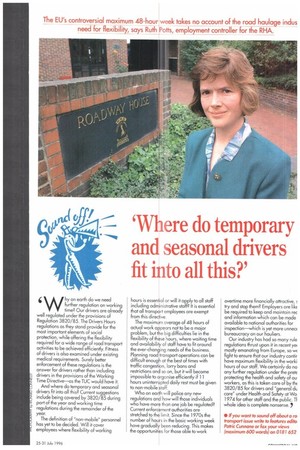'Where do temporary and seasonal drivers fit into all this?'
Page 49

If you've noticed an error in this article please click here to report it so we can fix it.
6 hy on earth do we need
further regulation on working time? Our drivers are already well regulated under the provisions of Regulation 3820/85. The Drivers Hours regulations as they stand provide for the most important elements of social protection, while offering the flexibility required for a wide range of road transport activities to be achieved efficiently. Fitness of drivers is also examined under existing medical requirements. Surely better enforcement of these regulations is the answer for drivers rather than including drivers in the provisions of the Working Time Directive—as the TUC would have it.
And where do temporary and seasonal drivers fit into all this? Current suggestions include being covered by 3820/85 during part of the year and working time regulations during the remainder of the year.
The definition of "non-mobile" personnel has yet to be decided. Will it cover employees where flexibility of working hours is essential or will it apply to all staff including administrative staff? It is essential that all transport employees are exempt from this directive The maximum overage of 48 hours of actual work appears not to be a major problem, but the big difficulties lie in the Flexibility of these hours, where waiting time and availability of staff have to fit around the ever-changing needs of the business. Planning road transport operations can be difficult enough at the best of times with traffic congestion, lorry bans and restrictions and so on, but it will become impossible to organise efficiently if 11 hours uninterrupted daily rest must be given to non-mobile staff.
Who on earth will police any new regulations and how will those individuals who have more than one job be regulated? Current enforcement authorities are stretched to the limit. Since the 1970s the number of hours in the basic working week have gradually been reducing, This makes the opportunities for those able to work overtime more financially attractive,5 try and stop them? Employers are likE be required to keep and maintain rec and information which can be made available to national authorities for inspection—which is yet more unnea bureaucracy on our hauliers.
Our industry has had so many rule regulations thrust upon it in recent ye( mostly emanating From Europe so wE fight to ensure that our industry contir have maximum flexibility in the worki hours of our staff. We certainly do no any further regulation under the pretE protecting the health and safety of ou workers, as this is taken care of by thE 3820/85 for drivers and "general dL care" under Health and Safety at Wo 1974 for other staff and the public. TI whole idea is complete nonsense.












































































































